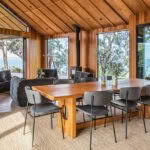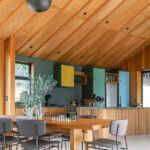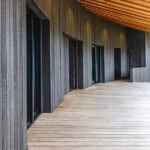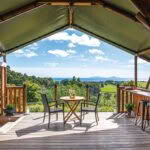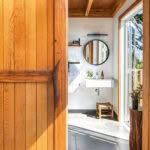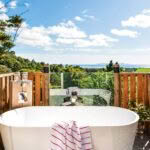How the Bowden family is ensuring the survival of native flora and fauna on the Tutukaka Coast
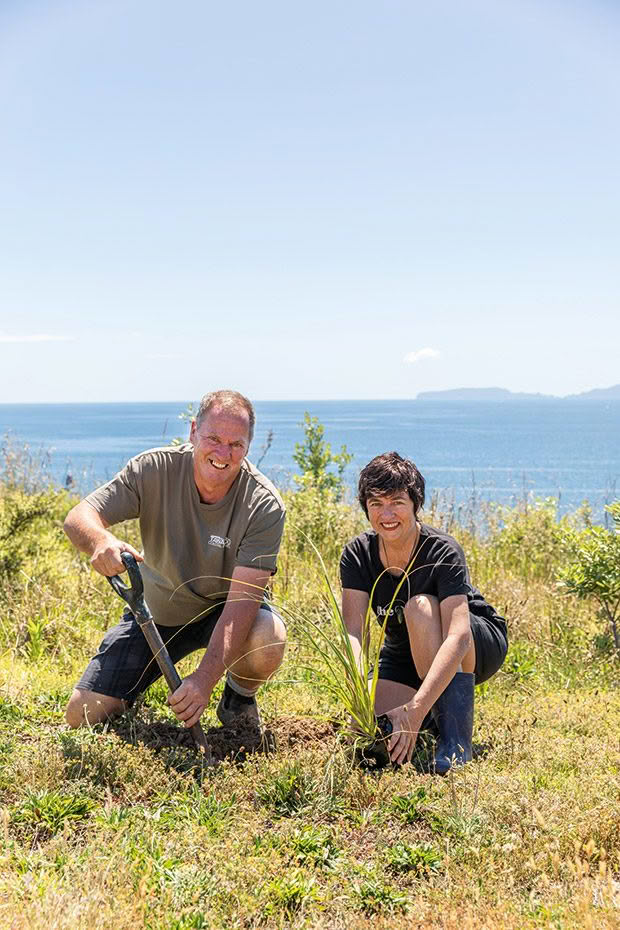
Tī kōuka (cabbage tree) is one of the many varieties replanted on the Bowden property near Tutukaka, north of Whangārei. On a good day, Helen Bowden can plant maybe 15 or so an hour which is admirable but not quite the 3000 to 5000 achieved during a recent community planting day. Her brother Guy, a nurseryman, grows the seedlings from locally sourced seeds gathered from the property, the nearby coast and islands.
Regard for the land remains firmly at the heart of this family after half a century of love, loss and regeneration.
Words: Cheree Morrison Photos: Milla Novak
Siblings Helen and Guy Bowden have slightly different recollections of being summoned to dinner as children. Helen remembers the sound of her mother Katharine’s voice, a mighty yell from a mighty woman, carried by the wind to her children playing in faraway parts of the family’s 121-hectare Tutukaka Coast property, Tawapou.
Guy, on the other hand, can still hear the distinct parp of a trumpet bouncing off the hillside, figuratively tapping him on the shoulder to lead him home. “We’d be off barefoot, spread across kilometres, so sometimes blowing a trumpet was the only way to drag us back,” he recalls.
Helen has idyllic memories of the free-range life she, Guy, and their four other siblings enjoyed at Tawapou. Until early 2020, they were just that for Helen, memories to be enjoyed, from time-to-time, in her Sydney-based life as a successful television producer. When that life simply stopped in mid-March of last year, she returned to New Zealand and settled back into her childhood home, telling her mother: “I might be here for a year.”
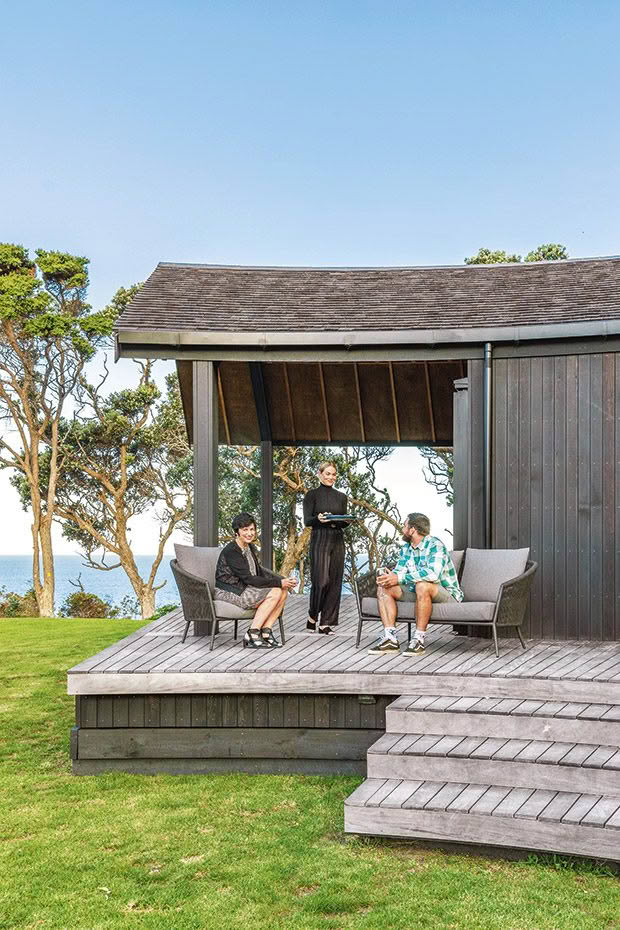
Helen’s nephew Darcy and his wife, Emily Clyma, were married near the curved house. The couple, a builder and BNZ agribusiness advisor, live nearby at Tawapou.
She couldn’t have picked a better place to spend a paused 12 months. Work did not stop — it was surprisingly easy to work remotely — and her bubble stretched. Daily, one of her 11 nieces and nephews popped in, often with a crayfish or three for Katharine. Guy, hilariously happy to have his sister home, regularly stuck his head around the corner of her home office to share his thoughts or latest idea. “It’s a full-on commune here,” says Helen.
All six siblings have a section on Tawapou. Helen now owns the family home, which she shares with Katharine and elderly pup Jess. Guy and his wife, Sandra, own Tawapou Coastal Natives and Matapouri Glamping. Sister Clare has a section. Sister Judy’s son, Sam, and his partner Rosie live on Judy’s slice near the nursery. Brother Roger and wife Emma live in Dubai, but their son, William, is onsite. And brother Tom owns a holiday home at the southern end.
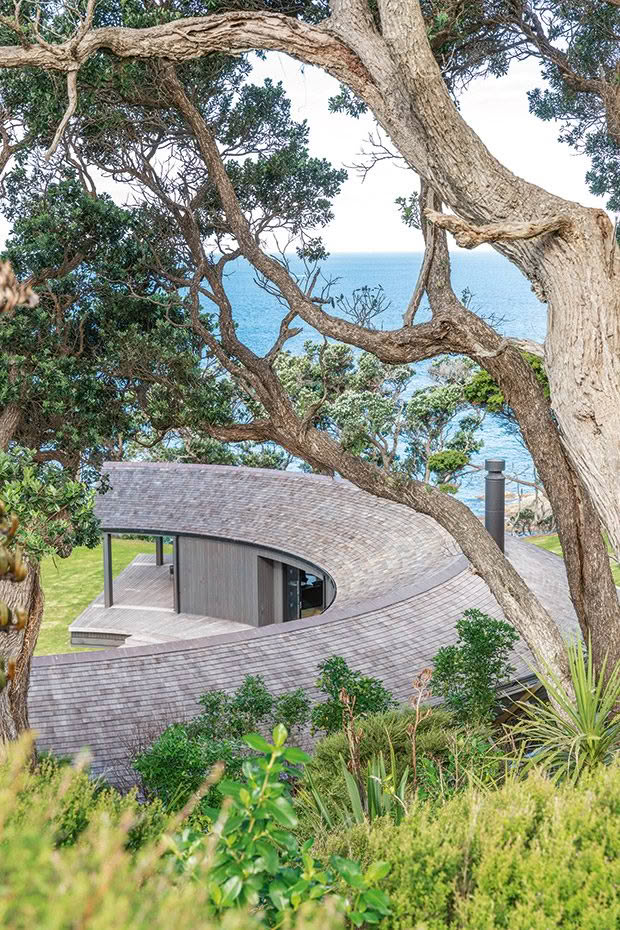
The majestic pōhutukawa above this award-winning curved house (belonging to another Bowden sibling, Tom) is one of the most extensive remaining pōhutukawa groves in Northland.
The Bowden roots run deep, and they’re all anchored to one person. Tawapou’s heart and soul is Dr Katharine Bowden, the family’s 92-year-old matriarch who, with her late husband, Dr Bernard Bowden, purchased the farm from an absentee owner in 1966. Each was well-known and respected in their fields. Katharine was a pioneer of family planning, spending 25 years establishing and running a clinic in Whāngārei, where she faced some hostility.
Her efforts came barely a decade after it was believed that “if contraceptives were more widely issued, they could destroy the moral stamina of the nation”, so it wasn’t uncommon for Katharine to face opposition, including being spat on. She went on to set up a general medical practice in Ngunguru. Bernard was an ophthalmologist known — among many achievements and leadership roles — for his work in the Cook Islands where he assisted with cataract treatments and provided care for patients on remote islands.
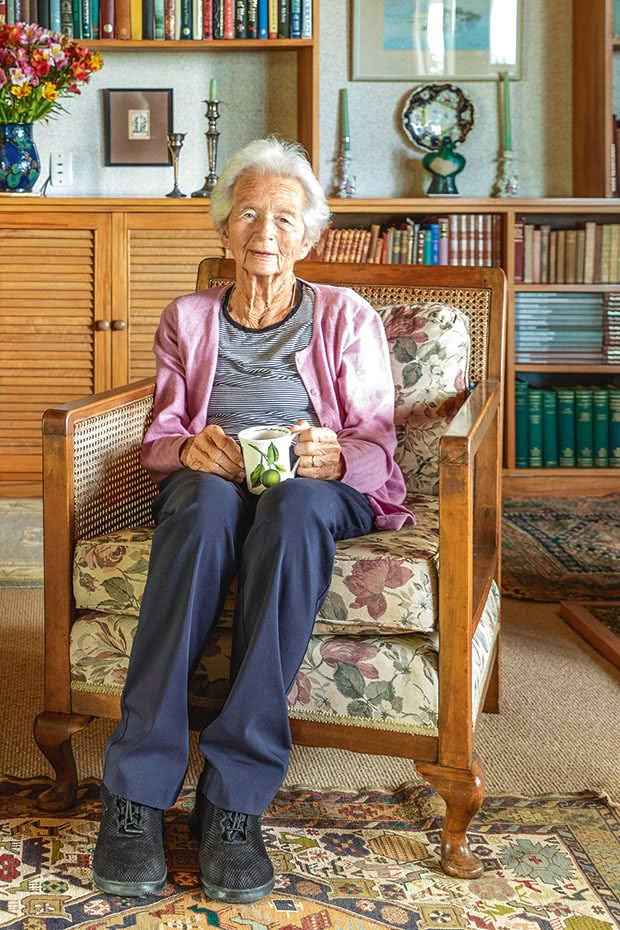
Katharine celebrated her 92nd birthday in the most “2020 way” possible — via Zoom call. She’s not only a successful doctor and mother of six but also an author — she somehow found time to publish a selection of short stories for her family, and a collection of health columns published in The Northern Advocate.
Katharine and Bernard were both keen amateur naturalists and loved the native bush, the birds and the marine life. “They had the foresight to fence off the native bush when their neighbours handed them a box of matches — the neighbours believed it was better just to burn it down and start again,” says Helen. Bernard died of non-Hodgkin’s lymphoma in 1980, aged 53, his death leaving a deep, still-present void.
“We’re incredibly fortunate that Mum was able to keep the land intact on her own. She worked like a crazy person; there were times that we thought she should sell some of it. All along the coast, the farms turned into lifestyle blocks, and while she sold the property across the road to cover the death duties, Tawapou remains the last of its size. I’m so proud of her and our family.”
- Architect Belinda George designed furniture to suit the gentle curves of the house including the dining table made by Smith & Parker Joiners of Whangārei from tōtara gifted to Tom from Guy. The design is based on a dining table made for their mother Katharine 50 years before by the same joinery firm.
- The curved cabinetry in the kitchen and bathrooms is sustainably sourced iroko, a west african hardwood. Belinda’s husband David handcrafted furniture for the bedroom and lounge from native timbers extracted from Northland rivers (nz-native-riverwood.com).
Unsurprisingly, the land, with its five beaches and three kilometres of coastline, has risen in value since the Bowdens purchased it — for about 8000 to 9000 pounds, guesses Guy. An asset of that size can put pressure on a family, so placing the land under QEII covenant in 2016 was a bold move but the right thing to do, says Helen. “There’s no going back, so it took economics off the table and gave everyone, including the next generation, a place to invest their energy.”
Aside from the six sections, and a small amount sold to finance the work, more than 90 per cent of the land is now untouchable. “QEII covenants protect the land forever, even if sold. It’s a huge commitment and there’s no turning back — that’s it,” she says.
“We share a common goal, but monthly meetings keep everyone on the same page,” says Guy.
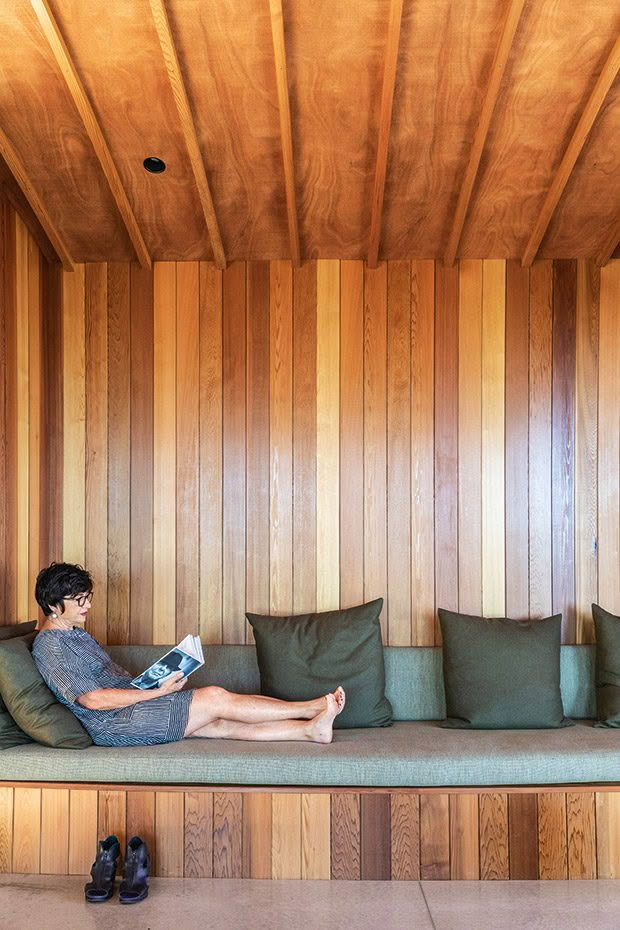
Perhaps inspired by her surroundings, Helen’s summer reading list had a New Zealand theme. Michael King’s A History of New Zealand held up for another read, while Rose Carlyle’s debut novel, The Girl in the Mirror, kept her nose to the page until the final full-stop.
Tawapou is the closest land to the Poor Knights Marine Reserve, a cluster of islands 22 kilometres from the coast, and the Bowdens plan to create a wildlife corridor between the islands and the property. Over the past 50 years, the family has replanted many hectares of native plants (65,000 in 2019 alone) and worked hard to control pests and create a safe habitat for
rare flora and fauna. “It’s a family project; we’ve all been out trapping, planting, weeding and teaching.”
The Bowdens established the locally focused Tawapou Conservation Trust in 2018 to manage and amplify their efforts. “With all the members of the family and our neighbours, we have a huge knowledge base and range of skills right to hand.”
They count success in small but mighty numbers. Fifteen kiwi released since 2014. One male gannet moving in with Guy’s 15 hand-painted decoys (and one decoy subsequently repainted after an enthusiastic but unsuccessful attempt at romance). Between nine and 15 oi (grey-faced petrel) chicks recorded in cliff burrows each year over the past four years. Five public planting days since 2014.
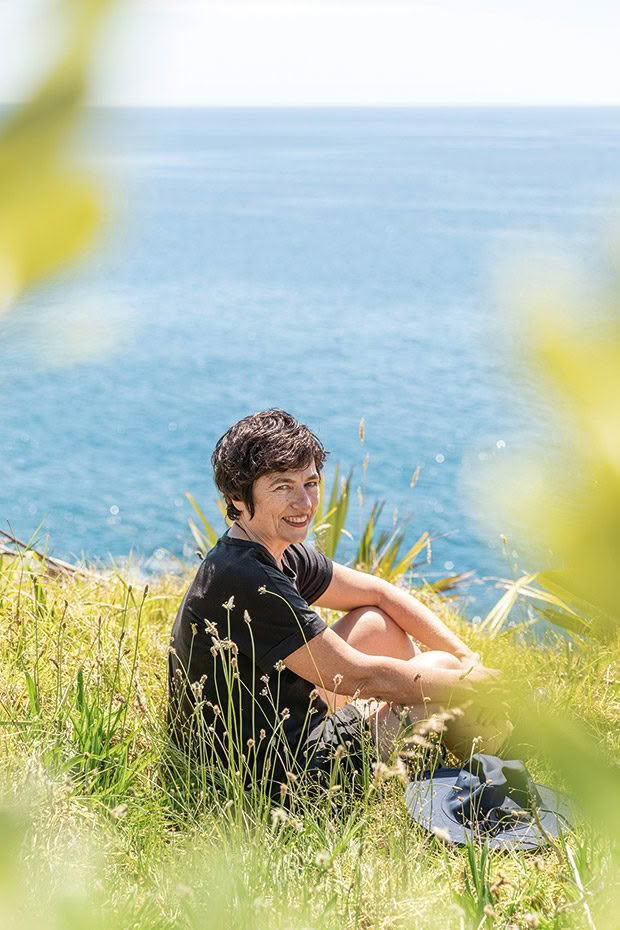
“It’s BYO spade, and we provide the plants, which have been grown from seeds harvested on the property or off-shore islands. We put on lunch and organize a speaker. It’s touching that people want to help — some of the most important restorations are happening on private land with citizen labour,” says Helen.
Her unexpected gap year has her living something of a double life. With soil under her fingernails and gumboots beneath the desk, she has continued to run Lingo Pictures, the television production company she established in 2015 with her business partner, Jason Stephens. Her CV includes The Secrets She Keeps (the first Australian drama series to sell to BBC1 primetime since 1995), Upright, The Slap and Lambs of God — just a few highlights of a career that spans several decades, several countries and numerous awards.
“Producing is fun but high pressure. My strength is in following ideas through with execution. Too often there’s a great idea, but it never lives up to its potential. You have to inspire, push, pull, cajole. My experience has taught me that there’s always an answer. Run towards trouble — face things head-on. Be brave. Speak up.”
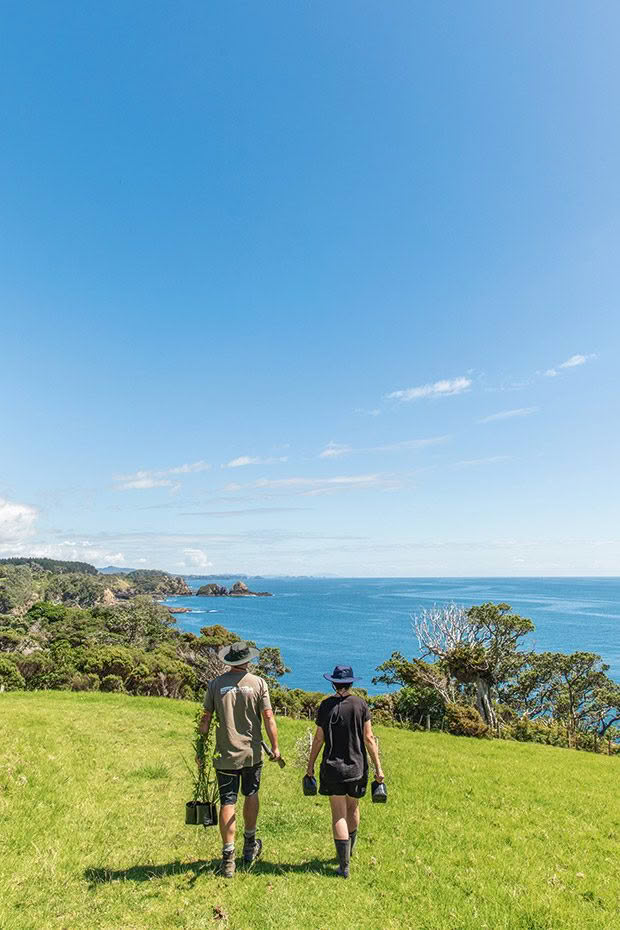
A high-powered television career was never the plan. Helen’s years at Massey University were more memorable for long-lasting friendships than studies. In the end, it was her London flatmate, an Israeli student training to be a director, who gave Helen a glimpse of the silver screen. It’s an industry that’s in a golden age as the rise in streaming services creates demand for forward-thinking ideas. “Companies are making so much amazing, bold content.”
Helen’s Sydney apartment is temporarily home to an actor and other family members, her office is successfully running remotely, so there’s no rush to head back across the ditch. There’s a New Zealand project in development, with Robyn Malcom, The Crown to watch with Katharine (it’s their favourite) and — if Guy has anything to do with it — probably another few thousand plants to plant. It’s life unexpected, in the most beautiful way.
“I’m so lucky to be here. 2020 has raised awareness of how we’ve been treating nature; that’s part of what caused this. We need to change, and we can.”
MATAPOURI GLAMPING
Guy’s wife Sandra accidentally stumbled upon a niche market for her homegrown glamping business — helping couples trying to escape their (very loved) children. “I love that we can do that for them,” she says. “It’s a retreat for couples. We’ve already had proposals here.” Sandra knows a little something about the ties that bind; as with everything on this land, connections run deep.
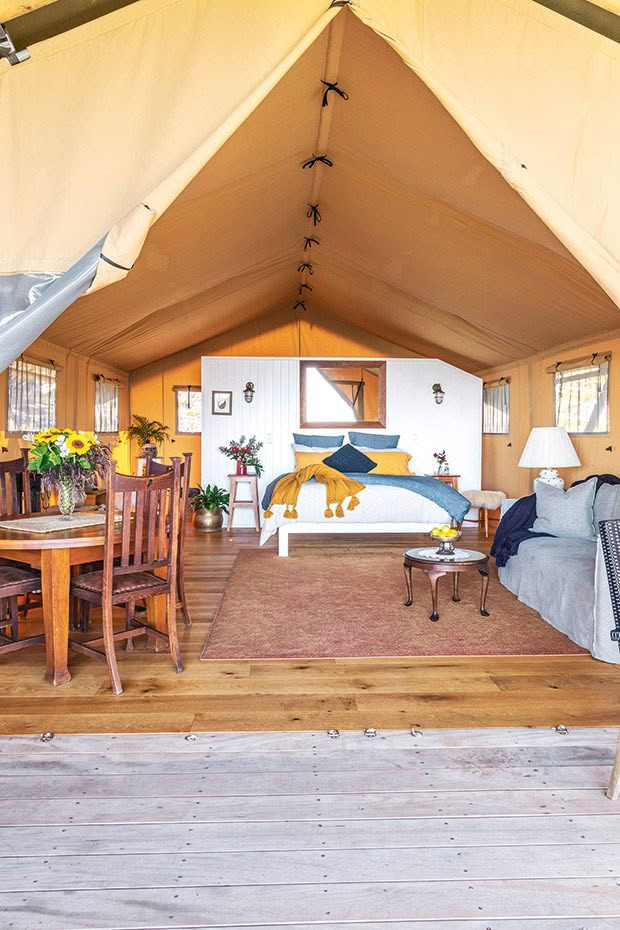
While the general messiness of 2020 thwarted Guy and Sandra’s opening plans for their glamping business, the safari tent didn’t go unused.
Sandra and Guy are old schoolmates. They married in 1990 and raised their children Hannah and Darcy on the property. “The kids loved it here; if they argued in the car, Guy would turn around and threaten to buy a house in town.” Sandra knows the feeling; she wouldn’t dream of being anywhere else, but as time has passed, the couple has considered easing their load. “Running the nursery is a physical job. We’d been looking to create a form of passive income to transition to as we get older. We wanted guest accommodation, but we didn’t want ‘normal’.”
The safari tent came from a company in Luxembourg, but — as mysteriously often happens with tents — there was a pole missing, delaying their plans a few months. “The tent comes with the canvas and poles, but the rest you design and customize. Guy handcrafted the woodwork from timber milled from the property and part of a wharf at Tutukaka Marina that was gifted to him when he left his job there.”
- The family would gather to drink rosé and enjoy the panoramic views across to the Poor Knights Marine Reserve (sure, each section shares the same staggering outlook, but each is just a smidge different).
- The little touches shine — Guy’s hand-carved door handles, flowers from local florist Coastal Floral and a book that tells the property’s story, written by the family.
- Convenience is key; the kitchen is fully equipped for cooking (although there are restaurants nearby at the Tutukaka marina) and the outdoor bath requires little more exertion than turning a tap.
Sandra opened Matapouri Glamping the week before the entire country shut down last year, which was the worst kind of impeccable timing. But in the months since, their bookings have been constant, and mostly local. “There was a bit of a weird feeling; a little anxiety around traveling too far from home. It is a special spot, with just the birds for company. It’s another world.”
THE CURVED HOUSE
Tom Bowden is yet another sibling who was never on time for dinner. He was more often than not transforming nīkau palm fronds into a make-shift sled and zooming down a slope on the southern end of the property. Tom is now an Auckland-based entrepreneur less prone to sliding down hills, but when it came to choosing his holiday spot, his heart led him home.
Tom’s curved three-bedroom off-grid house was designed by architect Belinda George and built from sustainable and reclaimed timber. The semi-circular house sits against the hillside, looking to the bush rather than the moody ocean, which is often in a tug-of-war with the rocks beneath it.
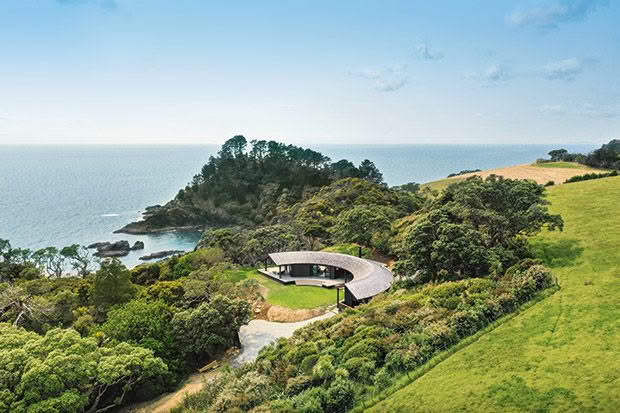
It was a winner in the NZIA 2020 Awards (Housing Auckland category), in which the judges remarked, “The house’s natural rhythm allows for spaces that connect with each other and the environment.”
There’s something else that connects Tom to the land, and it’s stickier and slimier than his sleek and chic coastal hideaway. “Tom’s passion is for New Zealand’s large, air-breathing land snails,” says Helen. “Believe it or not, it is fascinating if you get him started. They’re vulnerable and need our urgent protection.”
TAWAPOU COASTAL NATIVES
Guy (pictured below with his wife Sandra) may not have been the most invested at school, but he knows when the maths don’t add up. “The nursery started with growing pūriri trees from seed and people wanting to buy them. Sure, that was great until the day I stood back and realized, ‘Damn, I’m going to need 30,000 of these.’”
Guy started Tawapou Coastal Natives after a stint as the manager of the local marina. It was his father who planted the seed of inspiration. Guy used to follow him around the farm as he tossed seeds down cliffs. As it became more and more apparent that the kikuyu-thick pasture wasn’t going to nourish a farming fortune, Guy looked to what did flourish — native plants.
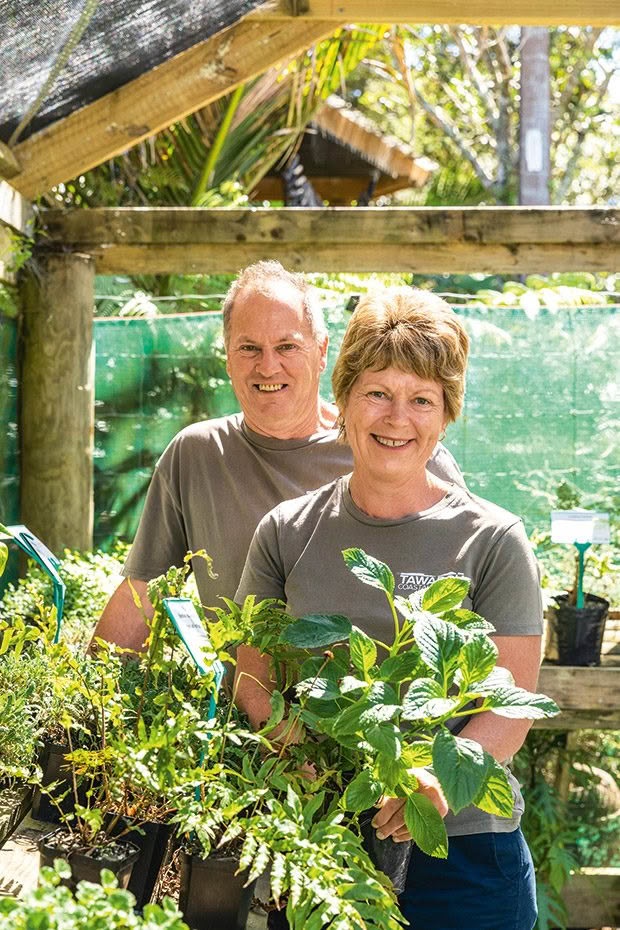
The nursery specializes in rare, local and off-shore plants, including the poor knights island lily. The lily (revered, but regarded as temperamental by gardeners) is only native to the nearby islands (with another genus in the species found on New Caledonia’s tallest mountain) and Guy says he initially killed more of the red bottlebrush-flowering plants than he grew. Once he worked out how to look after them, his business took off too.
The couple’s six-hectare nursery now grows approximately 180,000 plants a year, including the mammoth green roof for the new $33.2 million Whangārei Hundertwasser Arts Centre. The feat of engineering will include 150 large trees and more than 3500 ground cover plants. Some of New Zealand’s rarest plants will take root on the roof, including the Pennantia baylisiana, or three kings kaikamako, of which only a single wild specimen exists.
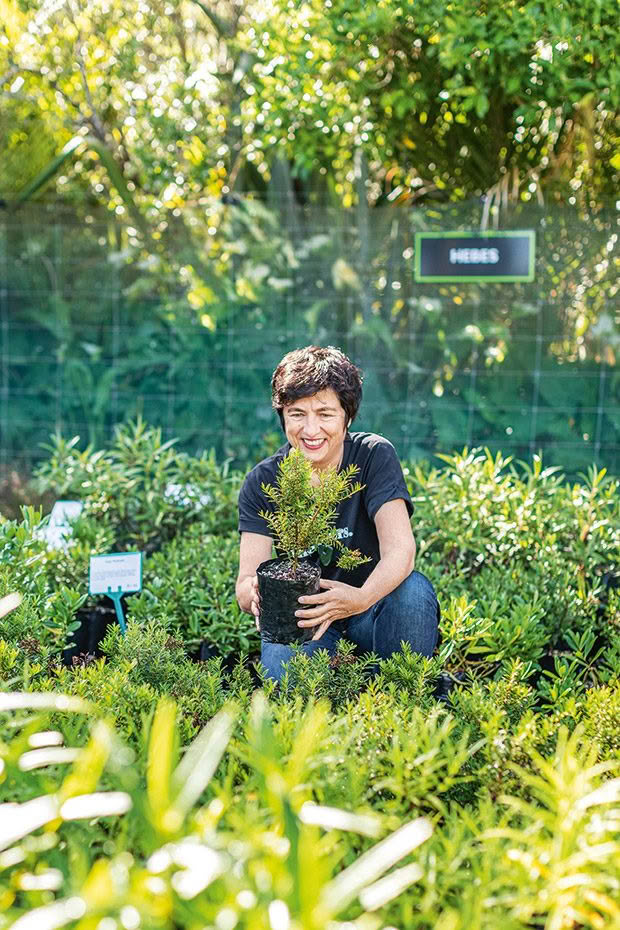
The beauty of Tawapou doesn’t stop where rock meets wave. Helen spends hours in the underwater world on her doorstep, snorkeling through snapper, blue maomao, stingrays and black angelfish. Back on land, planting comes with views of migrating whales, playful dolphins and pods of orca.
Guy has a knack for the rare and the wild. His pet project is protecting the flock of oi (grey-faced petrel) he discovered while hunting for coastal mānuka. “I feel an overwhelming sense of responsibility for them; we had the first north island chicks in 80 years born here. Finding them was like winning a prize.”
Love this story? Subscribe now!
 This article first appeared in NZ Life & Leisure Magazine.
This article first appeared in NZ Life & Leisure Magazine.
